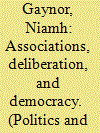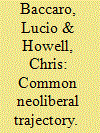|
|
|
Sort Order |
|
|
|
Items / Page
|
|
|
|
|
|
|
| Srl | Item |
| 1 |
ID:
109155


|
|
|
|
|
| Publication |
2011.
|
| Summary/Abstract |
Over the past two decades there has been a burgeoning interest and research into experiments and innovations in participatory governance. While advocates highlight the merits of such new governance arrangements in moving beyond traditional interest group representations and deepening democracy through deliberation with a broad range of civic associations, critics express concern about the political legitimacy and democratic accountability of participating associations, highlighting in particular the dangers of co-option and faction. Addressing these concerns, a number of theorists identify an important role for civic associations in linking deliberations at micro policy levels to those within the public sphere more broadly. These normative contributions raise an important empirical question-does civic associational engagement at micro levels leave scope to engage both laterally across associations and vertically with members and citizens more broadly? More simply put, is civic associational engagement within micro-policy fora "good" for democracy more broadly? Drawing from a study of civic associational engagement in Ireland's national Social Partnership process over a ten-year period this article argues that, where deliberations become overshadowed by more traditional communicative norms of bargaining and negotiation, it is not. Evidence is presented from the Irish case to show how civic actors, having internalized the dominant communicative norms of the process, have contributed toward a narrowing of the deliberative space within, but most particularly outside, this process. This, it is argued, has resulted in a considerably weakened public sphere with neither the institutional apparatus nor the discursive capacity to seek accountability from political and civic leaders at a time of profound crisis within the Irish state.
|
|
|
|
|
|
|
|
|
|
|
|
|
|
|
|
| 2 |
ID:
109158


|
|
|
|
|
| Publication |
2011.
|
| Summary/Abstract |
Based on quantitative indicators for fifteen advanced countries between 1974 and 2005, and case studies of France, the United Kingdom, Germany, Italy, Sweden, and Ireland, this article analyzes the trajectory of institutional change in the industrial relations systems of advanced capitalist societies, with a focus on Western Europe. In contrast to current comparative political economy scholarship, which emphasizes the resilience of national institutions to common challenges and trends, it argues that despite a surface resilience of distinct national sets, all countries have been transformed in a neoliberal direction. Neoliberal transformation manifests itself not just as institutional deregulation but also as institutional conversion, as the functions associated with existing institutional forms change in a convergent direction. A key example is the institution of centralized bargaining, once the linchpin of an alternative, redistributive and egalitarian, model of negotiated capitalism, which has been reshaped in the past twenty years to fit the common imperative of liberalization.
|
|
|
|
|
|
|
|
|
|
|
|
|
|
|
|
| 3 |
ID:
109159


|
|
|
|
|
| Publication |
2011.
|
| Summary/Abstract |
It's a commonplace that Federal Reserve chairman Ben Bernanke draws his policies from Milton Friedman and Anna Schwartz's A Monetary History of the United States (MH). With that in mind, this article establishes five points. First, contrary to conventional wisdom, Friedman and Schwartz merely insinuate their claim the Fed caused the Depression in MH. Second, their criticisms of Fed policy during the Depression, which turn on its refusal to adopt open market purchases (OMPs), repudiate Friedman's famed libertarianism and market fundamentalism. Third, Friedman and Schwartz don't refute the practical objections of bankers who opposed OMPs in the 1930s. Consequently, Bernanke's policies for addressing the financial crisis risk doing precisely what Friedman's targets warned against-encouraging financial speculation without addressing problems of unemployment. Fourth, Friedman and Schwartz's prescriptions entail a neoliberal, not a libertarian, state, one governed by technocrats and answerable to financial markets. Finally, what accounts for and unifies Friedman's contradictions is the beneficiary-finance.
|
|
|
|
|
|
|
|
|
|
|
|
|
|
|
|
| 4 |
ID:
109154


|
|
|
|
|
| Publication |
2011.
|
| Summary/Abstract |
During the past thirty years in the social sciences, there has been a wide-ranging discussion of "class politics" in capitalist modernity. Several distinct threads have developed, largely in isolation from each other. The authors suggest that the various accounts implicitly rely on different definitions of class politics and propose a way to classify them. The classification is based on two questions: first, whether changes in the strength of the left depend on the working class specifically or on cross-class dynamics and, second, whether emergent class differences in politics are largely spontaneous or constructed. The authors use this classification to assess the prospects for testing the empirical implications of different accounts and point to the more general insights potentially offered by each approach.
|
|
|
|
|
|
|
|
|
|
|
|
|
|
|
|
|
|
|
|
|